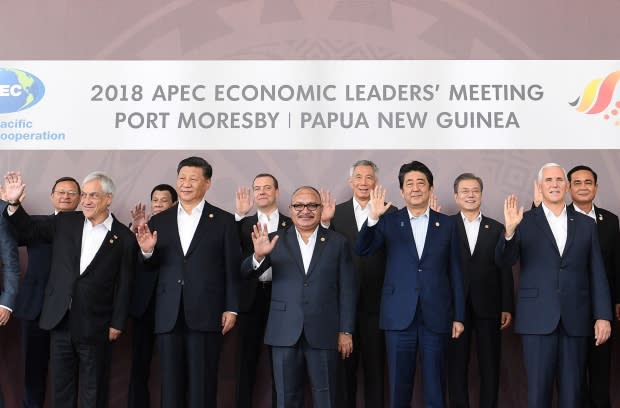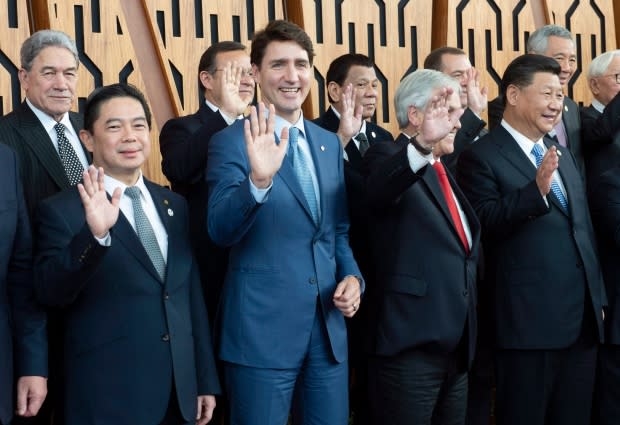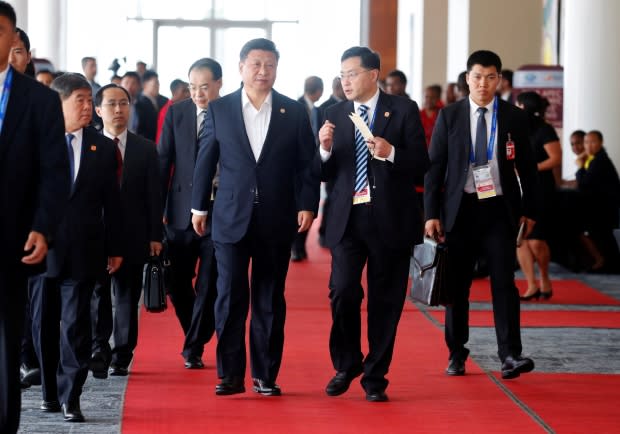APEC talks conclude without communiqué amid U.S.-China trade tensions
Leaders have left the Asia-Pacific Economic Cooperation Summit in Papua New Guinea without coming to a consensus on a final communiqué to describe what was agreed at their talks.
Prime Minister Justin Trudeau told a late afternoon news conference in Port Moresby that, when he left the summit, it appeared to be issuing only a "chair's summary" — a statement from Papua New Guinea Prime Minister Peter O'Neill, as opposed to one written on behalf of the group.
"We had a broad consensus on a wide range of issues," Trudeau said. "But I don't think that it will come as a huge surprise that there are different visions on particular elements in regards to trade and those prevented there from being a full consensus on the communiqué document."
"There were a number of countries involved," in the disagreement Trudeau said, including the U.S. and China.
O'Neill found himself in a pushy, moving scrum shortly after, and was a bit more blunt.
"You know, there were two big giants in the room. What can I say?" the chair of the talks said.
Trade issues divisive
According to O'Neill, the talks broke down over language about the World Trade Organization.
The U.S. has been unhappy for years with some aspects of WTO enforcement of the rules governing international trade. In particular, it objects to the way some rules are now applied to China, which the U.S. will not accept as a market economy because of the dominance of its state-owned industries.
Efforts are underway to propose reforms to the WTO, including one initiative led by Canada, in part to address longstanding American concerns.
The U.S. is currently blocking the appointment of any more judges to the WTO's appellate body, threatening the viability of the arbitration system countries use to resolve their disputes.
"The whole entire world is concerned about the debate that is going on about trade relations between China and, of course, the United States," O'Neill said. "This is a situation that both countries need to sit down and resolve. And I believe that the G20 meeting that is going to be held very shortly will be an opportune time."
"Conversations are going on to the last minute," Trudeau told reporters earlier in the afternoon about efforts to finalize the communiqué's language.

But during his news conference, he did not give any specific details on exactly what prevented one or more countries from signing off.
A summit communiqué like this is normally worked out in advance of the event. In this case, those efforts failed, and nothing that happened in the room between the leaders themselves was able to overcome the conflict.
Pence, Xi left summit site immediately
U.S. Vice-President Mike Pence and Chinese President Xi Jinping left APEC Haus, where the leaders were meeting, at midday, appearing to skip the working lunch scheduled for the leaders.
There were only two short windows of time when every leader was expected in the summit room Sunday.

The day started with another group photo — the third one in two days, right hands raised to wave and forced grins for the pool cameras, like a group of uncomfortable tourists.
Cameras covering the photo call noticed Pence and Xi chatting for about a minute and a half, according to a report from the Australian Broadcasting Corporation. Pence also spoke to Trudeau, although it's unknown what the pair discussed.

Then came the two main morning sessions: If they held to the published schedule, the leaders met with Christine Lagarde, the managing director of the International Monetary Fund, for about an hour, and then convened privately for half an hour to discuss the theme of this year's summit, "connecting for inclusive growth through [a] digital future."
And that was it. Leaders fanned out to pursue their own agendas and head for the airport.
Five leaders — Pence, Japanese Prime Minister Shinzo Abe, Australian Prime Minister Scott Morrison, New Zealand Prime Minister Jacinda Ardern, and the host, O'Neill — called a news conference to announce their financial support for improving Papua New Guinea's electricity grid, with a goal of connecting 70 per cent of the mostly rural, developing country's population by 2030.
Plotting strategy for G20
Trudeau held two bilateral meetings.
Before lunch, he met with Abe. The pair sat beside each other at the leaders' gala dinner Saturday evening and had a nearly two-hour informal conversation, a Canadian official said, prior to the 40 minutes they scheduled officially for Sunday.
While cameras were still in the room, Abe said through a translator that the pair "share fundamental values" and added that Japan's ready for a closer relationship to work on "global challenges."
Trudeau said that their conversation had been "warm and wide-ranging as they always are," and that the two countries would be working together in the weeks to come on the implementation of the Comprehensive and Progressive Trans-Pacific Partnership (CPTPP) — the 11-country Pacific Rim trade deal set to take effect Dec.30 after the required number of countries ratify it.
Trudeau also suggested Japan and Canada were working on joint strategy for the upcoming G20 in Argentina. Both countries have been among the leading advocates for WTO reform.
A readout from the meeting said the pair also discussed regional security issues, including North Korea's nuclear program.
Trudeau met with Australia's Morrison after lunch, and started brief media remarks by congratulating the still-new prime minister, who only took the reins in late August.

Canada and Australia have been "very well aligned" on trade issues at this summit, Trudeau said, joking that the two countries had been in a race to see who could ratify the CPTPP first, as the deadline approached for implementing its tariff cuts before the end of this calendar year.
Morrison called the implementation of the CPTPP an "extraordinary achievement" and "a statement of absolute advocacy for continued open, free trade," which other countries can join.
Like Abe, Morrison mentioned working closely with Canada at the upcoming G20 meeting at the end of this month.
Much like this APEC summit, other issues at the G20 now seem likely to be overshadowed by a U.S.-China trade showdown.
U.S. President Donald Trump is expected to meet Xi in person in Buenos Aires.

